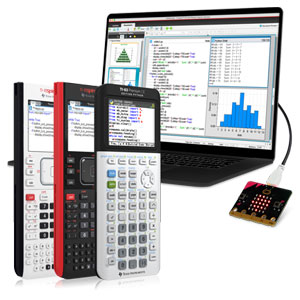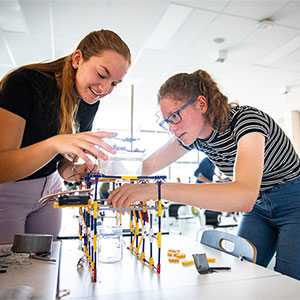-

Smart Irrigation With the TI-Nspire™ CX Ecosystem: “Students See That Mathematics Is Actually Very Useful”
Posted 29/08/2022 by Carlos CoelhoThe motivation and enthusiasm of the students at Molelos Secondary School in Tondela, Portugal, were the driving forces behind the Smart Irrigation project using the TI-Nspire™ CX Ecosystem. But it was maths teacher Olga Pestana who put the wheels in motion.
Read more... -

The Heartbeat of STEM
Posted 06/04/2022 by Jessica KohoutAre you interested in introducing your students to coding but are not sure how? Read about this heart-pounding STEM project that will get your students excited about programming.
Read more... -

Top 5 T³ Webinars From 2021
Posted 11/02/2022 by Sónia ReisThe start of a new year is the perfect time for setting new goals and prepping for the next few months of classes. Perhaps your goal is a large, year-long project, or maybe it’s a small, daily habit that you’d like to implement. Either way, one of the best ways to keep yourself motivated is by having a list. If professional learning is one of your goals, we’ve put together a list to help you get started. Here are the top 5 most watched T³ Webinars from 2021. These sessions are all free and available on demand. So, watch these recordings on your schedule and at your own pace!
Read more... -

Infrared Radiation and the James Webb Space Telescope
Posted 11/02/2022 by Ian GallowayThe James Webb Space Telescope has reached Lagrange point 2, one and a half million kilometers away, and is getting ready to explore the cosmos in the infrared part of the spectrum. Expansion of the universe means that after 15 billion years the light emitted by the earliest galaxies has stretched so that it is now in the infrared part of the spectrum. In this blog we focus on the discovery and use of infrared radiation.
Read more... -

Challenges From Space: The James Webb Space Telescope and Lagrange Points
Posted 01/02/2022 by Ian GallowayOn January 23, 2022, the James Webb Space Telescope reached its destination. This highly complex instrument is taking advantage of a cosmic location discovered by Euler and Lagrange more than 200 years ago. Read on to see how you can incorporate this into a classroom activity to calculate the Lagrange points.
Read more... -

Students Should Free Themselves From Pen and Paper, and Start Learning By Doing
Posted 17/11/2021 by Sónia ReisWith 25 years of teaching experience, Alexandre Gomes is practical about the role of technology in education. The physics and chemistry teacher, and T³ Europe instructor, believes that technology education in schools must evolve from theory to practice. "You need students to free themselves from pen and paper and to actually start learning by doing. And learning by doing, using Texas Instruments technology, makes perfect sense.”
Read more... -

Exchange and Cooperation: Value of the T³ Teacher Network
Posted 30/10/2021 by Stephan GriebelThe history of the T³ teacher network is a history of cooperation on many different levels. It is about cooperation between individuals as well as between institutions across national and ‘content’ boundaries.
Read more... -

Best Practice From France: How To Start Programming With BBC micro:bit and TI Handhelds
Posted 06/07/2021 by Ludovia, article originally published in Ludomag.comProgramming and teaching students how to code are an important part of the transformation of education in France. Four years after the start of this process, and a global pandemic later, two observations can be made that are also valuable for other countries in Europe. Firstly, teachers are willing to take up the challenge, but they are still very much in need of support. Secondly, numerous projects have been launched with the help of new tools to support both teachers and students to understand these new concepts. Among these tools, BBC micro:bit is popular, as is the TI-Innovator™ Hub and the robotic vehicle TI-Innovator™ Rover.
Read more... -

Computational Thinking for all students Dutch Leo Kanner school
Posted 13/05/2021 by Koen StulensThe aim of the Computational Thinking strategy at the Leo Kanner secondary school in Leiden is to teach children to approach problems logically and to use digital tools to solve them. To this end, the school organised a pilot programme using TI-Nspire™ CX technology. “An important plus is that you learn the basics of computational thinking through this technology,” says teacher Zeno van der Zalm. “We started small, but we are now in the phase where we are involving more teachers and subjects in the trajectory.
Read more... -

You go girl! The experiences of women in STEM
Posted 12/04/2021 by Sónia ReisWhat can we do to empower girls in secondary school to opt for a STEM focus in their education and career? In a world where scientific and technological solutions are desperately needed, we cannot exclude half the world’s talents. We need girls and women! Our T3 teacher network understands the importance of motivating girls to pursue STEM. Four T3 instructors and two students from Europe share their experiences with gender issues, classroom methods and STEM education.
Read more...










